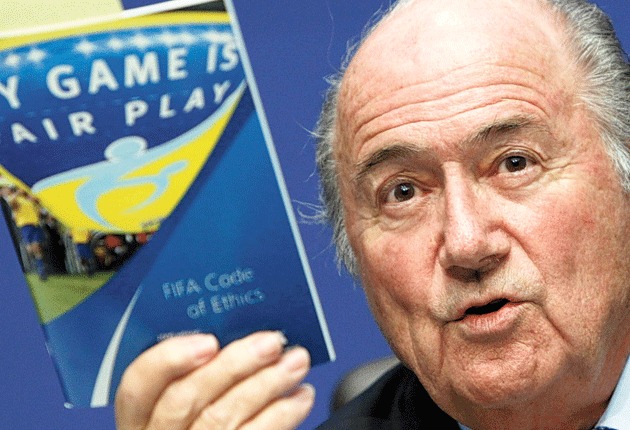Blatter: flawed voting process will stay in place

Your support helps us to tell the story
From reproductive rights to climate change to Big Tech, The Independent is on the ground when the story is developing. Whether it's investigating the financials of Elon Musk's pro-Trump PAC or producing our latest documentary, 'The A Word', which shines a light on the American women fighting for reproductive rights, we know how important it is to parse out the facts from the messaging.
At such a critical moment in US history, we need reporters on the ground. Your donation allows us to keep sending journalists to speak to both sides of the story.
The Independent is trusted by Americans across the entire political spectrum. And unlike many other quality news outlets, we choose not to lock Americans out of our reporting and analysis with paywalls. We believe quality journalism should be available to everyone, paid for by those who can afford it.
Your support makes all the difference.Fifa's president Sepp Blatter yesterday conceded it was a mistake to combine the bidding processes for the 2018 and 2022 World Cups – an error that has led to myriad corruption claims – but at the same time ruled out any postponement of the votes.
In a situation crying out for some transparency, Blatter also insisted the voting would remain exactly the opposite of transparent – and be carried out in secret, on 2 December, as planned.
Blatter insisted there was never any option to delay the voting, and that the voting will go ahead with only 22 members of Fifa's Executive Committee (ExCo) instead of the usual 24 if two suspended members remain suspended by the date of the vote. Nigeria's Amos Adamu and Tahiti's Reynald Temarii had their ExCo status rescinded after a Sunday Times investigation taped them both appearing to agree to sell their World Cup votes. "If people are suspended they will not be replaced," Blatter said.
Of the decision to run the 2018 and 2022 processes at the same time, and vote on the hosts on the same day, Blatter said: "I have said I assume the responsibility and I think it was not the right way to go."
At the same press conference where he made that admission however, he insisted the vote will go ahead, and further demonstrated Fifa's unwillingness to veer from its chosen course by ruling out any external investigation into corruption claims, which will be dealt with solely by Fifa's ethics committee.
The allegations surround not just the alleged agreements to sell votes but alleged collusion between bidding nations to trade blocks of support for each other in the votes. It has been alleged that the Spain-Portugal bid for 2018 and the Qatar bid for 2022 have colluded to deliver votes from each other's "camps" of supporters, seven in total. Those bidding nations deny the claims.
There are four bids for 2018: England, Belgium-Netherlands jointly, Russia, and Spain-Portugal. There are five bids for 2022: Australia, Japan, Qatar, South Korea and the US.
"The executive committee looked into the bidding process," Blatter said. "We are five weeks from the final decision so there was never a question of changing anything in the procedure. On 2 December, here in Zurich, the Fifa executive committee will hold a vote, which will be a secret ballot, and will determine the national associations which will host the 2018 and 2022 World Cup."
Blatter declined to answer most of the questions about The Sunday Times' allegations. He said the ethics committee will conduct an investigation and report back on 17 November.
"This [series of allegations] is an uncomfortable situation for Fifa but we must say that inside Fifa we have the necessary instruments to react properly," said Blatter. "The ethics committee are addressing a case that involves allegations of possible corruption. We will deal with them according to current regulations."
The ethics committee will meet on 15, 16 and 17 November and will hear evidence from people who Blatter described as "the main actors" in the case.
Blatter made some veiled criticism of The Sunday Times' methods, despite the paper's investigation clearly being lengthy, meticulous and based on long established and widespread suggestions of corruption within the Fifa family. "One can ask whether it is appropriate for newspapers and journalists to set traps for people," Blatter said. "I come back to what we have discussed today – if you were in that situation, how would you act?"
The most obvious answer to that would be: not by asking for many hundreds of thousands of pounds for my vote, paid into a private bank account.
Join our commenting forum
Join thought-provoking conversations, follow other Independent readers and see their replies
Comments